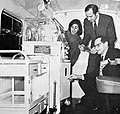Newborn transport
Newborn transport refers to the practice of transporting newborn infants, particularly those in critical condition, from one medical facility to another for specialized care. This practice is common in cases where the birth hospital does not have the necessary facilities or expertise to provide the required care for the newborn.
History[edit]
The practice of newborn transport began in the mid-20th century, with the development of specialized neonatal intensive care units (NICUs). Prior to this, critically ill newborns were often cared for in general pediatric wards, with limited specialized care available. The establishment of NICUs led to a need for safe and effective transport of newborns to these units.
Indications[edit]
Newborn transport is typically indicated in cases where the newborn requires specialized care that is not available at the birth hospital. This may include cases of premature birth, severe birth defects, neonatal sepsis, and other critical conditions. The decision to transport a newborn is typically made by a team of healthcare professionals, including the newborn's pediatrician, neonatologist, and other specialists.
Methods[edit]
Newborn transport can be carried out by various methods, depending on the distance to be covered and the urgency of the situation. This may include ground transport in specially equipped ambulances, or air transport in helicopters or fixed-wing aircraft. The transport team typically includes a neonatologist or pediatrician, a nurse, and a respiratory therapist.
Risks and challenges[edit]
While newborn transport can be lifesaving, it also carries certain risks. These include the risk of deterioration during transport, the risk of infection, and the risk of separation from the parents. The transport team must be well-trained and experienced in managing these risks.
Future developments[edit]
Future developments in newborn transport may include the use of telemedicine to provide remote consultation during transport, and the development of more advanced transport equipment to improve safety and effectiveness.
Ad. Transform your life with W8MD's Budget GLP-1 injections from $75


W8MD offers a medical weight loss program to lose weight in Philadelphia. Our physician-supervised medical weight loss provides:
- Weight loss injections in NYC (generic and brand names):
- Zepbound / Mounjaro, Wegovy / Ozempic, Saxenda
- Most insurances accepted or discounted self-pay rates. We will obtain insurance prior authorizations if needed.
- Generic GLP1 weight loss injections from $75 for the starting dose.
- Also offer prescription weight loss medications including Phentermine, Qsymia, Diethylpropion, Contrave etc.
NYC weight loss doctor appointmentsNYC weight loss doctor appointments
Start your NYC weight loss journey today at our NYC medical weight loss and Philadelphia medical weight loss clinics.
- Call 718-946-5500 to lose weight in NYC or for medical weight loss in Philadelphia 215-676-2334.
- Tags:NYC medical weight loss, Philadelphia lose weight Zepbound NYC, Budget GLP1 weight loss injections, Wegovy Philadelphia, Wegovy NYC, Philadelphia medical weight loss, Brookly weight loss and Wegovy NYC
|
WikiMD's Wellness Encyclopedia |
| Let Food Be Thy Medicine Medicine Thy Food - Hippocrates |
Medical Disclaimer: WikiMD is not a substitute for professional medical advice. The information on WikiMD is provided as an information resource only, may be incorrect, outdated or misleading, and is not to be used or relied on for any diagnostic or treatment purposes. Please consult your health care provider before making any healthcare decisions or for guidance about a specific medical condition. WikiMD expressly disclaims responsibility, and shall have no liability, for any damages, loss, injury, or liability whatsoever suffered as a result of your reliance on the information contained in this site. By visiting this site you agree to the foregoing terms and conditions, which may from time to time be changed or supplemented by WikiMD. If you do not agree to the foregoing terms and conditions, you should not enter or use this site. See full disclaimer.
Credits:Most images are courtesy of Wikimedia commons, and templates, categories Wikipedia, licensed under CC BY SA or similar.
Translate this page: - East Asian
中文,
日本,
한국어,
South Asian
हिन्दी,
தமிழ்,
తెలుగు,
Urdu,
ಕನ್ನಡ,
Southeast Asian
Indonesian,
Vietnamese,
Thai,
မြန်မာဘာသာ,
বাংলা
European
español,
Deutsch,
français,
Greek,
português do Brasil,
polski,
română,
русский,
Nederlands,
norsk,
svenska,
suomi,
Italian
Middle Eastern & African
عربى,
Turkish,
Persian,
Hebrew,
Afrikaans,
isiZulu,
Kiswahili,
Other
Bulgarian,
Hungarian,
Czech,
Swedish,
മലയാളം,
मराठी,
ਪੰਜਾਬੀ,
ગુજરાતી,
Portuguese,
Ukrainian






